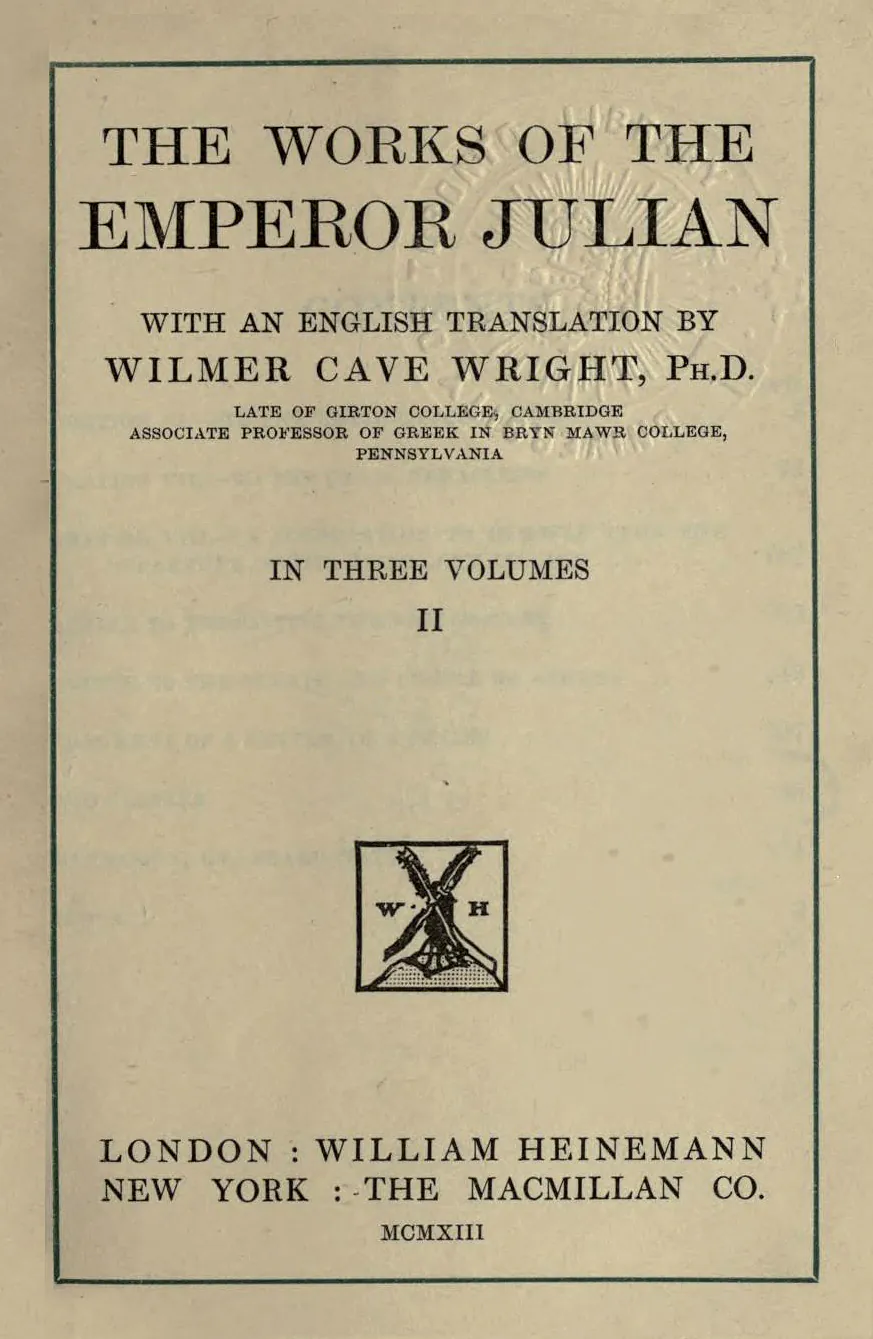[A]
καίτοι τούτῳ φησὶν ὡς θεῷ τοὺς Τρῶας εὔχεσθαι· εὐχομένας δὲ οὐκ ἔδειξεν ἐν τῇ ποιήσει οὔτε γυναῖκας οὔτε ἄνδρας, ἀλλὰ τῇ Ἀθηνᾷ ὀλολυγῇ πᾶσαι, φησί, χεῖρας ἀνέσχον, βαρβαρικὸν μὲν καὶ τοῦτο καὶ γυναιξὶ πρέπον, οὐ μὴν ἀνόσιον πρὸς τοὺς θεοὺς ὥσπερ τὸ παρ ̓ ὑμῶν ποιούμενον. ἐπαινεῖτε γὰρ ἀντὶ τῶν θεῶν τοὺς ἀνθρώπους,
[B]
μᾶλλον δὲ ἀντὶ τῶν θεῶν τοὺς ἀνθρώπους ἡμᾶς κολακεύετε. κάλλιστον δ ̓ ἔστιν οἶμαι μηδ ̓ ἐκείνους κολακεύειν, ἀλλὰ θεραπεύειν σωφρόνως.”
Ἰδού, πάλιν ἐγὼ τὰ συνήθη τεχνιτεύω λεξείδια καὶ οὐδ ̓ ἐμαυτῷ συγχωρῶ φθέγγεσθαι ὡς ἔτυχεν ἀδεῶς καὶ ἐλευθέρως, ἀλλὰ ὑπὸ τῆς συνήθους σκαιότητος καὶ ἐμαυτὸν συκοφαντῶ. ταῦτά τις καὶ τοιαῦτ ̓ ἂν λέγοι πρὸς ἄνδρας οὐ τὰ πρὸς τοὺς ἄρχοντας μόνον,
[C]
ἀλλὰ καὶ τὰ πρὸς τοὺς θεοὺς ἐλευθέρους εἶναι θέλοντας, ὅπως τις εὔνους αὐτοῖς ὥσπερ πατὴρ ἤπιος νομισθείη, φύσει πονηρὸς ὢν ὥσπερ ἐγώ. ἀνέχου τοίνυν αὐτῶν μισούντων καὶ λοιδορούντων λάθρᾳ ἢ καὶ φανερῶς, ἐπειδὴ κολακεύειν ἐνόμισας τοὺς ἐν τοῖς ἱεροῖς ὁρμῇ μιᾷ1ὁρμῇ μιᾷ Naber, ὁρώμενόν Hertlein, MSS. σε ἐπαινοῦντας. οὐ γὰρ οἶμαι διενοήθης ὅπως ἁρμόσει τῶν ἀνδρῶν οὔτε τοῖς ἐπιτηδεύμασιν οὔτε τοῖς βίοις οὔτε τοῖς ἤθεσιν. εἶεν. ἀλλ ̓ ἐκεῖνο τίς ἀνέξεταί σου; καθεύδεις ὡς ἐπίπαν νύκτωρ μόνος οὐδ ̓ ἔστιν οὐδέν,
[D]
ὅ σου τὸν ἄγριον καὶ ἀνήμερον μαλάξει θυμόν· ἀποκέκλεισται δὲ πάσῃ πανταχοῦ πάροδος γλυκυθυμίᾳ· καὶ τὸ μέγιστον τῶν κακῶν, ὅτι τοιοῦτον ζῶν βίον εὐφραίνῃ καὶ πεποίησαι τὰς κοινὰς κατάρας ἡδονήν. εἶτα ἀγανακτεῖς, εἴ του τὰ τοιαῦτα ἀκοίεις; ἐξὸν εἰδέναι χάριν τοῖς ὑπ ̓ εὐνοίας ἐμμελέστερόν σε νουθετοῦσιν ἐν τοῖς ἀναπαίστοις ἀποψιλῶσαι μὲν τὰς παρειάς, καλὰ δὲ ἀπὸ σαυτοῦ πρῶτον ἀρξάμενον δεικνύειν πάντα τῷ δήμῳ τῷ φιλογέλωτι τῷδε θεάματα,
[A]
(though he does indeed say that the men of Troy were wont to pray to Hector as a god); but in his poems he did not show us either women or men in the act of prayer to him, but he says that to Athena all the women lifted up their hands with a loud cry, which was in itself a barbaric thing to do and suitable only for women, but at any rate it displayed no impiety to the gods as does your conduct. For you applaud men instead of the gods,
[B]
or rather instead of the gods you flatter me who am a mere man. But it would be best, I think, not to flatter even the gods but to worship them with temperate hearts.’”
See, there I am again, busy with my usual phrase-making! I do not even allow myself to speak out at random fearlessly and freely, but with my usual awkwardness I am laying information against myself. It is thus and in words like these that one ought to address men who want to be free not only with respect to those who govern them but to the gods also,
[C]
in order that one may be considered well-disposed towards them, “like an indulgent father”2Odyssey 5. 12., even though one is by nature an ill-conditioned person like myself: “Bear with them then, when they hate and abuse you in secret or even openly, since you thought that those who applauded you with one accord in the temples were only flattering you. For surely you did not suppose that you would be in harmony with the pursuits or the lives or the temperaments of these men. I grant that. But who will bear with this other habit of yours?
[D]
You always sleep alone at night, and there is no way of softening your savage and uncivilised temper – since all avenues are closed to anything that might sweeten your disposition, – and the worst of all these evils is that you delight in living that sort of life and have laid pleasure under a general ban. Then can you feel aggrieved if you hear yourself spoken of in such terms? No, you ought to feel grateful to those who out of kindness of heart admonish you wittily in anapaestic verse to shave your cheeks smooth, and then, beginning with yourself, first to show to this laughter-loving people all sorts of fine spectacles,



